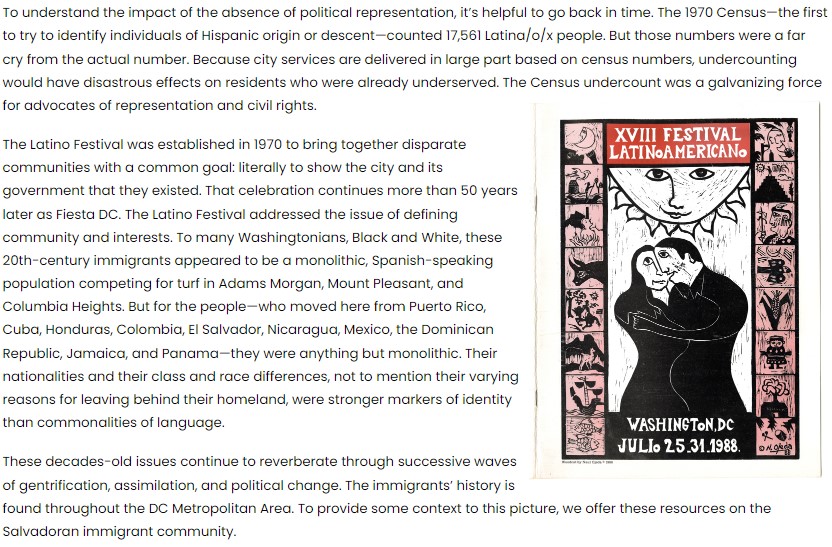The DC History Center’s Context for Today LibGuides offer historical background, patterns, and perspectives that provide context for current events. Many of the Context for Today guides began as conversations between expert historians, activists, and journalists brought together by the DC History Center. These expert voices discuss how current events are being influenced and shaped by history. Not all guides began as recorded conversations, and not all these conversations have become guides (yet), but those Context for Today long-format conversations that we have collected can be seen on the DC History Center’s YouTube channel.

As the fall intern at the DC History Center, I focused on transferring the Context for Today guides into LibGuides. This was my first introduction both to The DC History Center and to building LibGuides. Reviewing the Kiplinger Research Library collections on the guide topics, from posters of the 1988 Latino Festival to the DC Home Rule and Representation Ephemera, was engaging and exciting. Many of the guides already had a full range of research, with different kinds of media from a variety of sources and time periods but a few of them were ready for an update. I tackled Context for Today: Battles over Public Memorials first. This topic was particularly relevant during the immediate aftermath of the 2020 Black Lives Matter protests when activists began protesting and removing statues and monuments across the country. These memorials gave remembrance to the Civil War figures and events that symbolize systemic racism, slavery, and oppression to many Americans. The Context for Today: Battles over Public Memorials Libguide explores changing names for public spaces like schools or roads, removing public statues and memorials, and working to recontextualize and alter public perception of historical figures who have perpetuated the oppression of Black Americans and other marginalized groups.
Research guides on specific local topics are a valuable lens to see how historical events have influenced current events and the evolution of different causes, issues, and topics. These research guides seek to show first-person accounts and historical documentation where possible. This is combined with interpretations and modern understanding of a topic to show how an issue may have been viewed at the time, how it has evolved, and how public opinion and interpretations have affected it.

Explore the ten Context for Today LibGuides I created:
Battles Over Public Memorials
This LibGuide includes resources on controversy, removal, and debates over statues, school, and road names. It explores why renaming or removing controversial or offensive public memorials sparks intense feelings. Public memorials in DC as well as examples of public memorial controversy across the nation are also included.
A Laboratory for Federal Experiments
This LibGuide includes resources discussing Washington, DC’s unique position as a city without representation and how it is ultimately under the federal government’s control. Throughout the city’s history, DC residents have had little say in many decisions the federal government makes for them.
Comparing the Uprisings of 1968 and 2020
Many similarities can be drawn between the 1968 and 2020 uprisings. This LibGuide includes primary sources discussing the 1968 uprisings and further analysis of how these events were perceived over time. The resources in this guide outline the systemic racism that created the conditions leading to the uprisings in 1968 and 2020, and other similarities between them, drawing from many first-hand sources and accounts.
January 6th, 2021: Assault on the Capitol
Although the events of January 6, 2021 were shocking, it was not the only time the United States Capitol has been attacked. This LibGuide includes key analysis of the January 6th attack with guides for teachers to lead discussions with students. It also includes additional discussions on previous Capitol Building attacks and the impact of this unique locus of violence on the city and its residents.
Police Brutality and Reform in DC
This LibGuide includes sources on the history of policing in DC and how the city has attempted police reform in the past. The guide features resources on the Pilot District Project, including the Kiplinger Research Library’s records, papers, and ephemera on the subject.
Racism and Anti-Racism in the Federal Government
This LibGuide focuses on how Woodrow Wilson effectively removed and fired the majority of Black federal employees during his time in office and segregated the federal workforce. His racist policies greatly altered how the federal government hired Black people and what positions they could hold and changed the distribution of middle-class jobs in DC.
Salvadoran Americans in the DC Area
This LibGuide includes information from a variety of sources on the history of Salvadoran Americans in DC and how they have shaped the city. The sources in this guide focus on cultural identity, activism, and how Salvadoran Americans carved out a space for themselves in DC.
Segregating Where We Live
This LibGuide discusses the racially restrictive covenants which shaped DC’s neighborhoods, with links to extensive research on these covenants, analysis, maps, and raw data. Other topics include gentrification, the role of racism in home appraisals and real estate, and other factors shaping the racial makeup of neighborhoods. The interactive map of historic racial covenants is very detailed and interesting to explore how pervasive these discriminatory covenants were in parts of the city.
The Case for Statehood
These sources cover the historical breadth of the debate for statehood from the 1800’s through the present day and consider how statehood would change the city. The discussion in the video “Imagining DC Statehood” on the history of activism for statehood is particularly powerful.
The Fight for LGBTQ Rights
This LibGuide has a great variety of sources on life for LGBTQ people in DC, including the work of LGBTQ federal employees, historic bars and meeting places, and a spotlight on Black LGBTQ history in DC. There is so much cultural value included in this guide, featuring the Rainbow History Project’s collection as well as additional ephemera, papers, and photographs.
Roxane Chidlaw is an Urban Sustainability major at UDC who interned at the DC History Center during Fall 2023. She can be reached at roxane.chidlaw@udc.edu.
The DC History Center gratefully acknowledges the team who conceived and launched the Context for Today series, especially Jane F. Levey and Maggie Downing, as well as the team that produces it today.